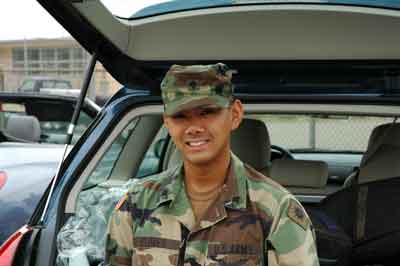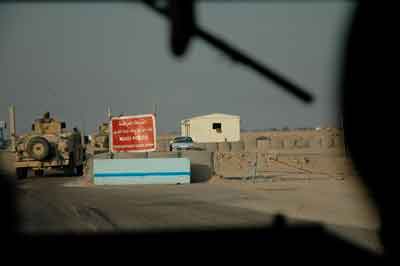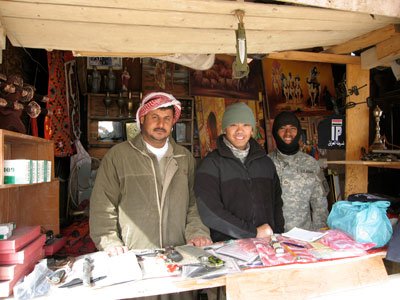I Was a Shitbag. Now, I Help Carry Others Through Their Darkness.
I was a shitbag.
When I shipped off to Army basic training at Fort Benning, my dad had a bet that I wouldn’t graduate, even though he encouraged my enlistment.
See, my dad was a military cadet in the Philippine military. According to him and his friends, he was a leader among the cadets, from marches and drills to after-school shenanigans. Having served during a military dictatorship, he thought he had an idea of what I was in for.

Army Spc. Michael Flores the day he left for Iraq in 2006. Photo courtesy of the author.
Although my dad saw something lacking in me, he didn’t discourage me. I enlisted as a medic at the beginning of the Iraq war, thinking I would make a natural leader. Looking back, it was obvious I was an inner-city kid surrounded by liberals and low expectations—I had no real sense my military life would be the complete opposite of that.
I knew, at least, I would wake up early in the morning, have perfectly shined boots that would get muddied by eight a.m., and see my physical limits tested. I would have to sacrifice for the team when the moment called for it, like jumping on a grenade or running across no man’s land to rescue a fallen comrade. I would be part of a well-oiled machine in which I was but a screw, and I would have to remain steady so it could destroy with the force of a hurricane. Watching movies about war—Forrest Gump, Saving Private Ryan—had taught me as much. TYFYS.
What I didn’t expect was the intense social pressure to perform, and how we treat people who can’t meet the bar. I was one of them.
In basic training, I found myself in a constant brain fog, especially in the mornings when we had to clean latrines, shine metal surfaces, and make our beds. The hospital corners on my bunk were sloppy. I walked around bleary-eyed, barely eking out the minimum of shaving my face. Everyone else buzzed around like fastidious worker bees. Everyone was tired, but somehow I was more tired. I also have a terrible sense of rhythm, so I always got stuck in the back of a marching formation. I literally marched to the beat of my own drum. It still hurts to remember I had to go to remedial training for shooting my rifle.
All that could’ve been forgiven—no trainee is perfect—but I had the look of a shitbag. The term is straightforward. It means someone who is incompetent and unmotivated and drags down the competence of the unit they operate in.

A checkpoint in southern Iraq, where Army Spc. Michael Flores served as a combat medic in 2006-2007. Photo courtesy of the author.
The part that did me in was the limp. Three weeks into basic, I developed a stress fracture in my lower left leg. With every step, I had the sensation of my leg being crushed. An X-ray showed a clear crack right down the middle of my shin. I hobbled everywhere.
Immediately, I was ridiculed—“You’re making this up.” Or, “Which leg is broken today?” I argued that my X-ray was proof of my injury, but my fellow recruits wouldn’t believe me without seeing it. (If you were in my platoon and are reading this, I still remember your face and name.)
While training in the field, we were collectively punished. I had what they called a “profile,” which prevents sergeants from exercising you in specific ways. My particular injury prevented me from doing jumping jacks. The sergeant leading the exercise/punishment became furious but couldn’t do anything about it. He took his anger out on my platoon with additional repetitions while I stood on the side doing overhead arm claps. The platoon would shout out loud at me: Shitbag. If I joined them, it would perhaps relieve them of some suffering but would damage the credibility of my injury. So I stood on the side hearing how awful a soldier I would be.
Award-Winning Journalism in Your Inbox
Dad, did you expect this?
Thankfully basic is just a single breath in someone’s enlistment. Necessary but fleeting. When I graduated, I marched before my dad, and he gleamed with pride. He told me how he’d bet on my failure, and although my brow furrowed, I still laughed.
In medic school, people took a chill pill, and no one cared about my limp. When I got to my unit, the sergeants asked about my day and sat with me for hours as I learned to shoot my weapon. They thought nothing of my injury or my daze. I even earned a weapon “expert” qualification, a minor point of pride.
Nonetheless, I wasn’t an exceptional soldier by any means. Just a regular ol’ Joe, and after being called a shitbag, I was content with being regular.
But I joined during a time of war. Three years after I enlisted, at the age of 20, I deployed to Iraq as a medic with an infantry unit. Like many who serve in combat for an extended period of time, I was eventually diagnosed with post-traumatic stress disorder and depression.
While on leave, I learned a friend was killed. The circumstances devastated me, made worse because I believed his death was wholly preventable. The rational part of my brain knew I couldn’t do anything for someone already gone. But as a medic, I unconsciously burdened myself with the responsibility of bringing everyone home. I had failed.
During a memorial service for a fallen soldier one early morning at Camp Bucca in southern Iraq, I stood at the back. The wind blew hot, dry, and dusty. Some men gazed ahead stoically while others wept openly. I looked at the scene and heard my own voice come at me: shitbag. As the commander talked about what a great man our fallen comrade had been, I gutted myself like a fish. Where was my moral courage to have prevented his death?

Army Spc. Michael Flores visits an Iraqi souvenir vendor. Photo courtesy of the author.
Seven years later, I stare at my firstborn child. My mind is foggy, reminiscent of the cloud I’d experienced during basic training. Now I’m angry with unresolved guilt, too. My wife sees it—the fury and desperation. She whisks our child away, shouts at me to stay away, and slams the door behind her. I am not myself. I am captain …
Shitbag.
Later, I stare at a video screen in a medical clinic in the working-class neighborhood of Santa Ana, California. A VA nurse greets me, soothing my nerves with his soft voice. I don’t feel judged. I look around the room decorated with pastels and war art propaganda from WWII. The decorations try to say thank you. I feel mentally suffocated.
The nurse gives me a depression questionnaire, and I score on the severe side. Are you thinking of suicide? he asks. I sheepishly eke out a yes, the first time I’ve ever admitted it to anyone, including myself.
My therapist calls me sensitive and says that is part of why I burden myself with things I shouldn’t. I unnecessarily guilt-trip myself over minor mistakes. She tells me this in such a way that I come to these conclusions before she voices them. She is cunning.
After mentally beating myself up for years, convinced I am worthless, a psychiatrist sits across from me and says she will treat me for bipolar depression. It’s worse than regular depression, she says. When I don’t get enough sleep, I become manic. I begin to understand why I was a groggy mess at key points in my life.

After leaving the Army, Michael Flores worked as a documentary filmmaker in New York City. Photo courtesy of the author.
At home, my wife holds me close after another nightmare. She tells me I am a good person, and this slowly lodges in my brain.
Another night, my phone rings late, and a soldier from my unit asks, “Doc, you up?” The flatness of his voice betrays him—he has depression. I ask if he’s suicidal, and he admits that he is. He has come to me because he knows I will understand. We talk for four hours, and I convince him to call the Veterans Crisis Line. Two months later, he thanks me for listening, for still being Doc. I took care of them over there, I can take care of them back home, I tell myself.
Another soldier calls. He has chased a man down after a road rage incident. I walk him into the OIF/OEF transition center at the VA and link him with help. Later, I see him at a reunion, and he smiles and laughs. We don’t mention the VA.
The calls come every few months, tapering off as the years go by. I listen to voices strained with anger, or hollow with depression and resignation. I am the last stop before they reach the end of the line. I make sure they never reach the end of the line.
Our Journalism Depends on Your Support
I help them. But I also help myself. With every phone call, the voice that puts me down grows quieter.
How funny, I think as I lay in my hammock with my daughter securely in my arms, that my broken shin would come to symbolize me. Broken, I marched on. I even carried a few over the finish line. Dad owes me.
I am not a shitbag.





Comments are closed.